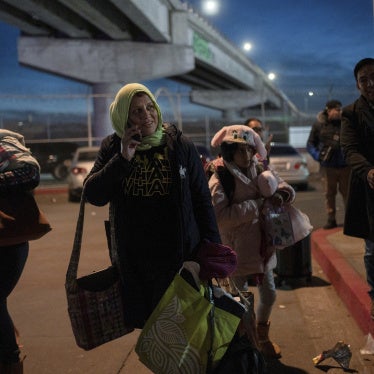(New York) -- The governments now meeting in Geneva to affirm their commitment to refugees have actually adopted laws and policies that undermine the letter and the spirit of the Refugee Convention, Human Rights Watch said today.
It is ironic that the very same states that conceived the 1951 Refugee Convention fifty years ago are now the main culprits in whittling away this important human rights instrument," said Rachael Reilly, refugee policy director at Human Rights Watch.
The 141 state parties to the 1951 Convention will meet in Geneva on December 12-13 to adopt a declaration of their commitment to the 50-year-old Convention, the culmination of a year of global consultations on refugee protection issues organized by the Office of the United Nations High Commissioner for Refugees (UNHCR).
Key industrialized states have violated core provisions of the Refugee Convention in recent years. They are: Australia, the United States, the United Kingdom and other member states of the European Union. These governments and others have returned refugees to places where their lives or freedom are under threat, sometimes in a discriminatory manner, and subjected asylum seekers to prolonged detention.
For the past two decades, states have steadily eroded their obligations under the Refugee Convention. For example, the refugee definition is being restrictively applied and narrowly interpreted in many countries, particularly in Western Europe and Australia. Moreover, the events of September 11 have been used as a pretext by many countries to introduce ever more restrictive immigration and asylum laws and policies.
The anti-terrorism measures taken by some states in the aftermath of the September 11 attacks on the United States will also seriously erode core refugee protection standards. Human Rights Watch criticized a new anti-terrorism law in the U.S. and a bill still under discussion in the United Kingdom that would allow for the indefinite detention of non-citizens suspected of terrorism, including asylum seekers and recognized refugees, without adequate appeal rights. In both countries the new measures contain an overly broad and vague definition of terrorism that includes individuals with links to a terrorist organization, no matter how tenuous or distant in time, thus risking guilt by association.
Further, proposals in the U.K. exclude asylum seekers from refugee protection if they are suspected of terrorism, without any substantive investigation of their asylum application. This runs counter to UNHCR guidelines that asylum seekers should receive a full and fair examination of their asylum claim before they are excluded from refugee protection. Asylum seekers often have been falsely prosecuted for crimes in their countries of origin, especially if they belong to a persecuted political, ethnic, social or religious group.
"States should not use counter-terrorism measures as a guise to roll back well-established refugee and human rights protection standards," said Reilly. "Recent measures fall foul of the Refugee Convention and accepted human rights standards."
Human Rights Watch used the occasion of the gathering to call on states that have not yet ratified the 1951 Convention and its 1967 Protocol to do so, and urged countries to lift existing reservations and limitations to the Convention. Turkey, for example, despite being party to both the Convention and protocol, continues to maintain a geographical limitation to the Convention, only recognizing refugees from Europe. This policy results in Turkish border guards every year pushing back thousands of refugees to countries such as Iran and Iraq where their lives are seriously at risk, in violation of the Refugee Convention's core principle of non-refoulement.
Finally, Human Rights Watch urged states to comply with their obligations under the Convention to cooperate fully with UNHCR in its duty to supervise the implementation of the Convention. States currently interpret and implement the Convention in vastly inconsistent ways that often serve their own political interests, rather than protect the interests of refugees. Human Rights Watch said that there is a need for an independent monitoring body that will review states' compliance with the Convention. Independent oversight bodies currently operate in the United Nations system to evaluate compliance with other human rights treaties, such as the International Covenant on Civil and Political Rights and the U.N. Convention against Torture.







